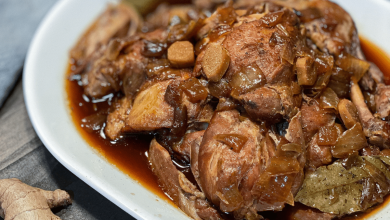African Peanut Stew (Elephant Stew!)
African Peanut Stew, often humorously referred to as “Elephant Stew,” is a delightful and hearty dish with origins in West Africa. It’s a flavorful and comforting stew known for its rich, creamy texture and unique combination of ingredients. Here’s a detailed breakdown of what it is, its history, components, preparation steps, and approximate cooking time:
What is African Peanut Stew (Elephant Stew)?
African Peanut Stew is a traditional dish that varies across different West African countries, such as Senegal, Ghana, and Nigeria. It typically consists of a thick and savory peanut (or groundnut) sauce that is used to simmer a variety of ingredients like vegetables, proteins, and sometimes even seafood. It’s known for its nutty flavor, spiciness, and a hint of sweetness, making it a popular and beloved dish.
History:
The exact history of African Peanut Stew is difficult to trace, but it has deep roots in West African cuisine. Peanuts were brought to Africa by Portuguese traders in the 16th century, and they have since become a staple ingredient in many African dishes. Peanut stews have been a part of African culinary traditions for centuries, and variations of this stew have been enjoyed by generations.
Components:
The components of African Peanut Stew can vary, but here are the common ingredients:
- Protein: It can include chicken, beef, lamb, or even vegetarian options like tofu.
- Vegetables: Common vegetables used are sweet potatoes, carrots, bell peppers, and spinach.
- Aromatics: Onions, garlic, and ginger provide the stew with a rich flavor.
- Peanut Butter: This is the star ingredient that gives the stew its creamy texture and nutty taste.
- Tomatoes: Often canned or fresh tomatoes are used to add a tangy element.
- Spices: Common spices include chili powder, paprika, cayenne pepper, and ground coriander.
- Broth: Vegetable or chicken broth is used as a base to create the stew’s liquid.
Steps to Prepare African Peanut Stew:
Here’s a basic outline of the steps to prepare African Peanut Stew:
-
Sauté Aromatics: In a large pot, heat oil and sauté finely chopped onions, garlic, and ginger until fragrant.
-
Brown Protein: Add your choice of protein (if using) and brown it on all sides.
-
Add Vegetables: Stir in the vegetables and spices. Cook for a few minutes until they start to soften.
-
Add Peanut Butter: Mix in peanut butter to create a thick, creamy sauce.
-
Pour in Broth and Tomatoes: Add the broth and canned tomatoes (if using). Stir well to combine.
-
Simmer: Bring the stew to a simmer, cover the pot, and let it cook until the vegetables are tender and the flavors meld together. This usually takes about 30-40 minutes.
-
Adjust Seasoning: Taste the stew and adjust the seasoning with salt, pepper, and additional spices if desired.
-
Serve: Serve the African Peanut Stew hot, often garnished with chopped peanuts and fresh cilantro. It’s commonly served over rice or with crusty bread.
Cooking Time:
The total preparation and cooking time for African Peanut Stew can vary depending on the specific ingredients used and the cooking method. However, on average, it takes approximately 1 to 1.5 hours to prepare and cook this flavorful stew.
Enjoy your journey into African cuisine with this delicious and unique Peanut Stew, and feel free to customize it to your taste preferences!
Certainly! Here are some nutrition facts and health information for African Peanut Stew (Elephant Stew):
Nutrition Facts (Approximate per serving):
- Calories: 350-450 calories (varies based on ingredients used)
- Protein: 15-20 grams
- Carbohydrates: 30-40 grams
- Dietary Fiber: 5-7 grams
- Sugars: 7-10 grams
- Fat: 20-25 grams
- Saturated Fat: 4-6 grams
- Cholesterol: 20-40 milligrams
- Sodium: 500-700 milligrams (varies based on broth and seasoning)
- Potassium: 600-800 milligrams
- Vitamin A: 30-40% of daily recommended intake
- Vitamin C: 30-40% of daily recommended intake
- Calcium: 4-6% of daily recommended intake
- Iron: 15-20% of daily recommended intake
Health Information:
-
Protein: The stew contains a moderate amount of protein, which is essential for muscle health and overall body function.
-
Carbohydrates: It provides a good source of complex carbohydrates from vegetables and starches like sweet potatoes, which offer sustained energy.
-
Dietary Fiber: African Peanut Stew is relatively high in dietary fiber, which aids in digestion and helps you feel full longer.
-
Healthy Fats: The stew contains healthy fats from peanut butter, which are monounsaturated and polyunsaturated fats. These fats are beneficial for heart health.
-
Vitamins and Minerals: It’s rich in vitamins like A and C, which support immune function and skin health. The presence of iron helps with red blood cell production, and potassium is essential for maintaining electrolyte balance.
-
Sodium: Depending on the broth and seasoning used, the stew may contain a moderate amount of sodium. Be mindful of your sodium intake if you’re watching your salt intake.
-
Vegetables: The inclusion of various vegetables provides essential vitamins, minerals, and antioxidants, contributing to the stew’s nutritional value.
-
Peanut Butter: Peanut butter adds a good dose of protein, healthy fats, and vitamin E to the stew.
-
Customization: You can customize the stew to suit your dietary preferences, such as making it vegetarian or vegan by omitting meat and using vegetable broth.
-
Moderation: While African Peanut Stew is nutritious, it’s important to consume it in moderation, especially if you’re monitoring calorie intake, as it can be calorie-dense.
Remember that the specific nutritional content of your stew may vary depending on the exact ingredients and proportions used, so it’s a good idea to calculate precise nutrition facts if you have specific dietary requirements or restrictions.








